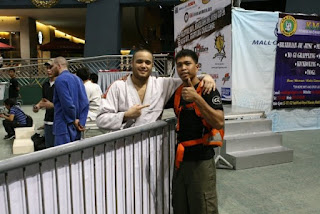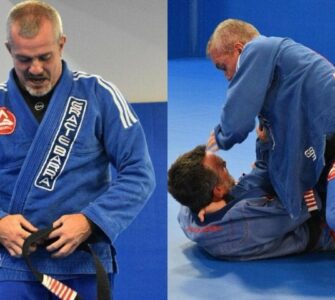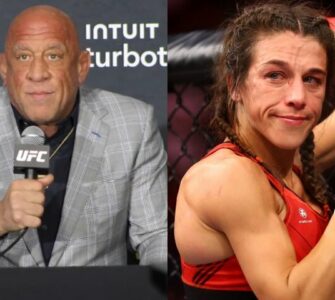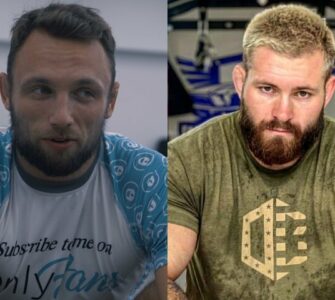Brazilian Jiu-Jitsu is a very demanding sport. You’re grabbing, pulling, pushing, getting thrown, and generally exerting a huge amount of energy. It is such a great workout that it is one of the best weight loss programs that I know of. How many out of shape guys and girls did I see starting BJJ and after 3 or 4 months of regular training, slim down naturally to a leaner and meaner physique? Almost all who stuck with regular training.
For BJJ competitors finding the ideal weight can mean everything. Being in a weight class above your natural weight can mean being overpowered by bigger guys, and being in a weight class under and dehydrated and weak can mean being overwhelmed by very fast and agile guys.
I’m not a doctor, a scientist, or a fitness instructor so please don’t take this article as medical advice. What I do have are years of training and competing and using my body as a guinea pig to find my optimum weight to be the best BJJ player that I can be.
 |
| Me at a competition in the Philippines (in white gi) at 93 kilos |
Let’s first look at finding your ideal weight when you’re training and not competing. Call it doing BJJ as an amateur or for leisure. In this case, you need to be in shape but not in competition shape. So let’s look at my case as an example. When I started BJJ, I was a bloated 98 kilos weight lifting 21 year old, who had previous experience training muay thai . After a few months of training every day, I slimmed down to 91 kilos. After 6 months of training I entered my first competition in the heavy division (94, 3 kilos with gi on). My very limited game was basically to bully my way to work on top. The guys in that weight class felt stronger than me, and even though I came 2nd, I felt that the extra mass I had on me prevented me from being fast and explosive. After a few months, I cut down to 86 kilos (so competing in the medium heavy division 88,3kilos with gi on), and suddenly discovered a whole new world of techniques and moves at my disposal that I could actually do without too much effort. All these moves that I couldn’t do as an overweight 91 kilos, because I was too slow or heavy, were added to my game. I discovered that I had a decent guard and that I was now fast and when someone would try to sweep me, I would bounce right back up like a cat. This was it; I had found my home at this weight! This was the period when my BJJ game really grew. Physically I never felt better, and looked good, my face and body were more cut.
 |
| Me at the Serbian open (white shirt) at 84 kilos |
|
A few years later, I decided to try my luck the 82, 3 kilos division. That meant that I had to be around 80 kilos on completion day. I slowly cut weight over a 3 month period. It wasn’t that hard. At around 82 kilos my game was very fast paced and technical, however I couldn’t hold the mount position as well and I had lost some power but not much. Cutting the last two kilos 2 days before the competition was very hard and I basically came into my first fight completely dehydrated and without much strength. At the end, I ended up getting the bronze but I didn’t feel that good and this weight cut was too much for me.
It was important to try all three weight categories
and to measure the pros and the cons of each one. At the end, I decided that 86 kilos would be my ideal weight and that I would stick to that. The thing that really bothered me when being overweight was the fact of being limited in my BJJ game because of my heavy physique. It’s like having access to just 50% of weapons. It wasn’t worth it. You couldn’t grow in your learning of techniques as much as if you were in shape.
Now competition weight is a different story. I think that the best is to hover around 2 or 3 kilos above your weight class when you don’t have a competition, and gradually lose 3 kilos around 2 months before the competition date. The day of the competition you should be lean, mean, aggressive, and hungry to win. There is a saying that my Croatian friend Hrvoje says: “Hungry lions run faster” And I think that this illustrates exactly what you should be on competition day. Of course in BJJ you are weighed before your first fight so you can’t do the crazy weight cutting that goes on in MMA where the weigh-ins are the day before so guys dehydrate and hydrate up to 8 kilos in some cases. In that logic, if I were to compete in MMA, I would fight in the welter weight division (GSP’s), and do a huge weight cut.
Some people have said that in terms of body fat percentage, if you walk around at 8% BF then that’s the exact weight class you fit in. I don’t really believe in measuring your body fat percentage to determine your ideal weight class. The most important is how you feel in the said weight class. In training and competition, if you feel strong, big, and fast compared to the other competitors in your division or in the academy, then chances are you’re in the right place.
So to summarize, for everyday training, find a weight were you feel comfortable, strong and fast. Don’t let being overweight cripple and limit your BJJ progress. If you compete, do the effort of cutting down to a weight were you will be a lean, mean killing machine. Trust me, it’s worth it.


















